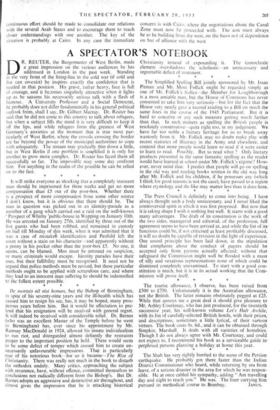De mortuis nil nisi bonum, but the Bishop of Birmingham,
in spite of his seventy-nine years and the ill-health which has caused him to resign his see, has, it may be hoped, many pros- perous years before him. But it would be affectation, to pre- tend that his resignation will be received with general regret. It will indeed be received with considerable relief. Dr. Barnes (who was an excellent Master of the Temple before he went to Birmingham) has, ever since his appointment by Mr. Ramsay MacDonald in 1924, allowed his innate individualism to run riot, and disregarded almost defiantly the restraints proper to the important position he held. " There would seem to be some defect of temper which caused him to create un- necessarily unfavourable impressions. Thal is particularly true of his notorious book—for so it became—The Rise of Christianity. There was really not much in the book to disturb the orthodox unduly. Many critics, approaching the subject with reverence, have, without offence, committed themselves to conclusions not radically different from the Bishop's. But Dr. Barnes adopts an aggressive and destructive air throughout, and almost gives the impression that he is attacking historical ehristianity instead of expounding it. The iconoclastic element overshadows the scholastic—an unnecessary and regrettable defect of treatment.


































 Previous page
Previous page